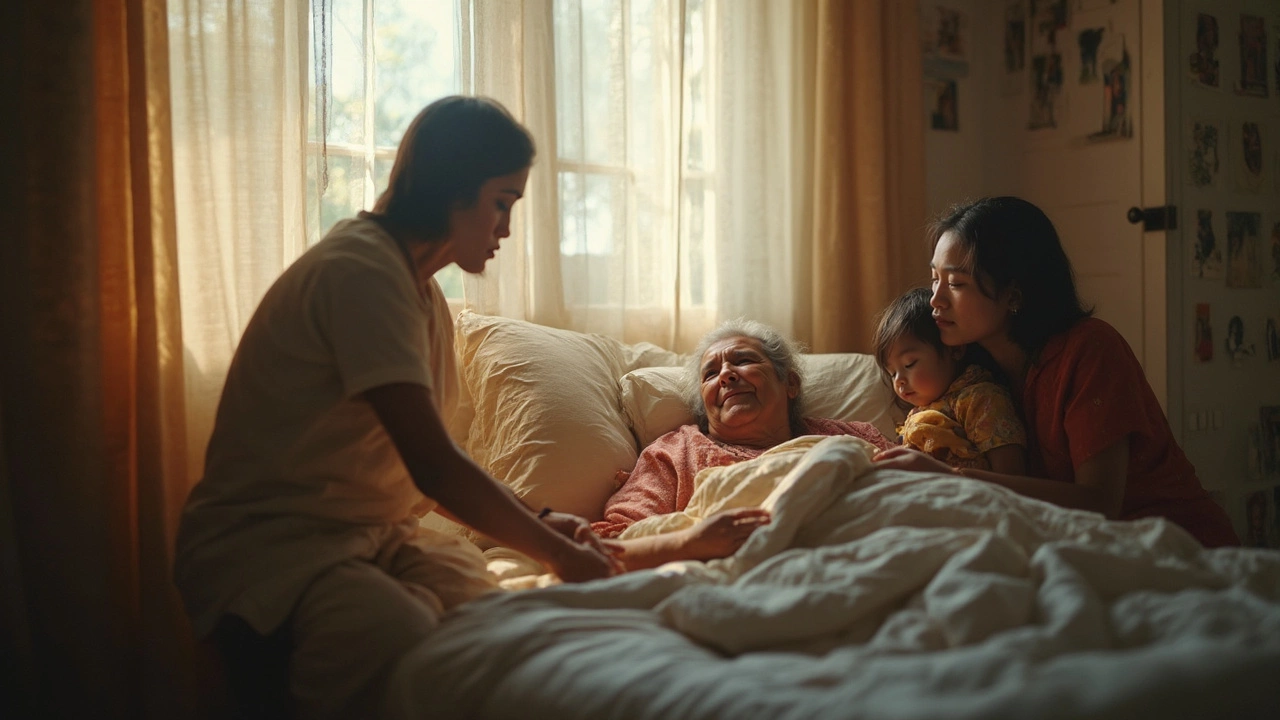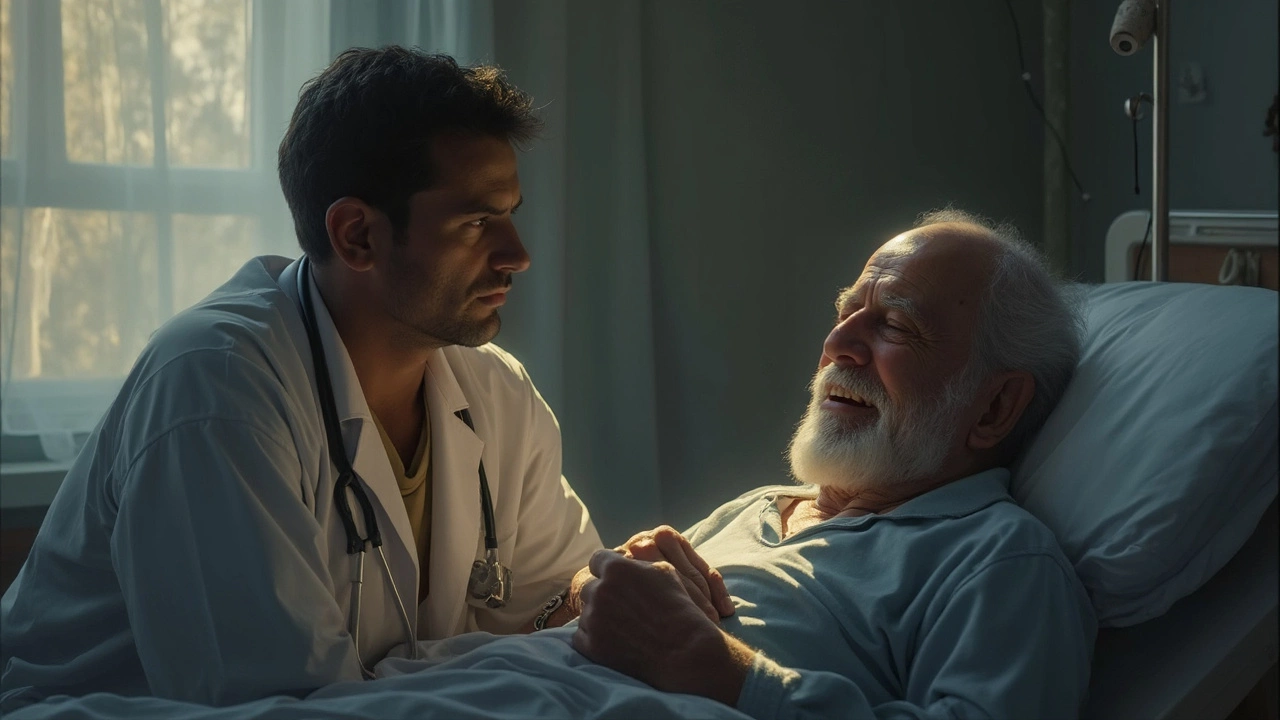
When my dad was dying of cancer, nobody warned us how quickly things would change the last couple of weeks. It catches most families off guard—one week you’re talking about doctor visits, the next you’re calling in hospice. If you’re caring for someone with advanced cancer, knowing what happens about two weeks from the end can help you handle heavy days with a bit more confidence.
This isn’t about scaring anyone. It’s about pulling back the curtain. If you see a sudden shift in how much your loved one eats, sleeps, or speaks, you’re not alone—these changes often show up together as life draws to a close. That cluster of signs has been tracked in real-life palliative care studies. Doctors use these clues to reassure families, but it’s the small stuff—dry lips, confusion, restless legs—that really throws you when you’re in it.
So, what should you look for? Less appetite isn’t laziness—food just isn’t on the body’s priority list anymore. Drowsiness grows, and folks spend most of the day sleeping. You might notice odd breathing patterns, skin changes, or tough conversations about pain and comfort. And yes, emotions run wild, on both sides: fear, guilt, love, relief—they all mix together. Let’s run through what to expect and small ways to help, minute by minute, day by day.
- Physical Changes: What You’ll See
- Mental and Emotional Shifts
- Comfort Measures that Matter
- Real Talk: Supporting the Family
Physical Changes: What You’ll See
Two weeks before death from cancer, the body honestly starts shutting down in ways you can see. You might notice stuff like eating less, sleeping more, or not wanting to talk as much. This isn’t about your loved one giving up—these changes are part of the body saving energy for what matters most. Here’s what you’re likely to spot, and what each thing means.
- Less Eating and Drinking: Appetite shrinks, and drinking practically stops. The body just doesn’t need as much fuel. Forcing food or drinks at this point won’t help—tiny sips, bits of ice, or moistening lips are fine.
- More Sleeping: Most people nap a lot. Waking hours shrink from half the day to just a few minutes at a time. This isn’t something you can change or fix.
- Less Communication: Talking slows down. Toward the last week, some can’t speak at all or only manage a few words. It’s okay; hearing usually stays sharp even if they’re quiet.
- Breathing Changes: This one makes families nervous. Breathing gets noisy, sometimes with long pauses (Cheyne-Stokes). This is usually harder on you than it is on them.
- Skin Changes: Hands, feet, and knees might look bluish or feel cold. Blotchy patches can show up on the arms and legs. That’s the blood shifting toward vital organs.
- Restlessness or Picking: Fidgeting, pulling at clothes, or picking the air is called "terminal agitation." Sometimes it signals discomfort or confusion.
Here’s a quick snapshot of what research shows about physical changes in the final weeks (thanks to the Journal of Pain and Symptom Management):
| Symptom | % Patients 2 Weeks Before Death |
|---|---|
| Loss of appetite | 80% |
| Increased sleep | 70% |
| Confusion/restlessness | 65% |
| Skin color changes | 60% |
| Breathing pattern changes | 64% |
It’s easy to worry you’ll miss something important. But really, these shifts follow similar patterns for most people with advanced cancer. Try to focus on comfort—soft bedding, dim lights, soft music, or just sitting quietly nearby. Don’t stress if you can’t fix everything. Just being there counts the most at this stage.
Mental and Emotional Shifts
Two weeks before death, people with cancer usually have mental changes that can confuse or worry families. It’s not all sadness—sometimes folks get agitated, withdraw, or say odd things. For doctors and nurses, these changes are expected. They even call it "terminal delirium" when confusion or restlessness shows up near the end.
You might spot the following:
- Trouble with focus or memory—maybe repeating questions or losing track of conversations.
- Hallucinations—seeing people who aren’t there, or talking to loved ones from their past.
- Increased anxiety or sudden calmness, which can flip from day to day.
- Withdrawal—less interest in talking, or staring into space for long spells.
- Moments of clarity where your loved one seems totally present, even after being unresponsive.
Mental health shifts aren't always smooth. One study showed up to 88% of families notice their loved ones become withdrawn or have confusion in the last weeks. Here’s a quick look at common emotional changes during the final stretch:
| Symptom | How Common |
|---|---|
| Confusion/Delirium | 60–80% |
| Agitation or restlessness | 50–60% |
| Emotional withdrawal | 70–85% |
| Hallucinations | 30–50% |
So, what helps? For starters, don’t take sudden mood changes or hurtful words personally. The brain is struggling—this isn’t the real person talking. Keep things calm and familiar. Play quiet music or hold their hand. If your loved one can’t talk much, just being there matters. Alarms and bright lights make things worse, so try to keep the room peaceful. Having familiar faces nearby usually helps more than you think.
For families, having honest, simple conversations early makes a difference. Ask what matters most while it’s still possible. Don’t ignore the awkward stuff—saying "I love you," sharing a memory, or just sitting in silence can ease fear. Mental changes in this stage aren’t unusual in cancer care, even if they rattle you. If things get rough, palliative care nurses have ways to make things softer. Never hesitate to ask for help—no one expects you to know all the answers.

Comfort Measures that Matter
The two weeks before the end of life with cancer are about small comforts rather than big interventions. Hospitals and hospice teams know this: the goal isn’t curing anything now, it’s easing pain, shortness of breath, and distress. Research shows most people dying of advanced cancer feel more at ease when comfort care is the focus, not aggressive treatments. A study from 2023 pointed out that the majority of families reported better satisfaction and less stress once pain control and symptom relief became the main priorities.
The basics matter most. Think lip balm for chapped lips, soft blankets for chills, and mouth swabs for dry mouths instead of pushing fluids. Most folks stop feeling hungry or thirsty near the very end, so don’t push food. It’s common for people to worry about starving or dehydration, but research shows these aren’t painful ways to go at this stage—the body naturally shuts those signals down.
- Keep the room cool and quiet, but offer layers for comfort.
- Use gentle massage or lotion to ease restless legs or sore spots.
- Turn the person regularly to prevent pressure sores—every 2 hours is typical if they can’t move themselves.
- If they’re breathing oddly or get noisy rattling in the chest (called the "death rattle"), tilting their head or using extra pillows helps more than any medicine.
- Pain medicine is top priority—most are given as pills, patches, or under the tongue because swallowing gets tough.
- If the person is agitated or confused, soft music, a familiar voice, or just holding hands soothes better than any medicine.
Here’s a simple table summarizing what helps and what doesn’t in those last weeks:
| Symptom | What Helps | What Often Doesn't Help |
|---|---|---|
| Pain | Pain medications, repositioning, quiet room | Extra tests, loud noise, waking for vitals |
| Dry mouth | Mouth swabs, lip balm, ice chips | Forcing fluids, hard candies if not alert |
| Breath changes | Fans, raising the head, calm voices | Oxygen masks (if non-responsive), suction machines |
| Weakness | Assistance, bed pads, soft cushions | Trying to get up alone, frequent moves |
One last thing—almost everyone worries about “doing things wrong.” If it’s clear you care, and you’re reacting to what your loved one needs in the moment, you’re doing it right. Keep teams—nurses or hospice—on speed dial for advice. When in doubt, go for comfort first every single time.
Real Talk: Supporting the Family
If you’re walking through the last weeks of a loved one’s cancer journey, it’s not just medical stuff you have to juggle. The real mess is emotional. You get hit with a mix of dread, exhaustion, and weird moments where family tension flares up over tiny things.
One fact: about 60% of family caregivers in the U.S. say they feel overwhelmed during end-of-life care. About 1 in 4 say they don’t have anyone outside their household to help. Damaging myths—like “you have to be strong” or “don’t cry in front of them”—often leave families feeling isolated and drained.
Here’s what actually helps when you're in this situation:
- Talk honestly: It’s okay to admit this is hard. Little, honest conversations beat fake pep talks every time.
- Share tasks: Divide jobs—meds, paperwork, updates to relatives, food runs. Write it on a fridge chart so people know what’s theirs.
- Set boundaries: It’s fine to step away for a breather or tell well-meaning visitors you need quiet. Your stress is real, and taking care of yourself isn’t selfish.
- Ask for help: Don’t rely on hints. If you need someone to pick up the kids or grab groceries, ask directly—texting works.
- Find support: Lots of cancer centers offer family counseling or local support groups. Sometimes just hearing "me too" helps you breathe again.
- Expect messy emotions: Guilt, anger, relief—all normal. Nobody handles this perfectly. Accept support if you can, and don’t judge your feelings.
Families talk a lot about medical care. They rarely talk about what happens after—the paperwork, the funeral planning, the phone calls. Here’s a quick table with tasks people face most:
| Common Family Tasks | Helpful Resource or Tip |
|---|---|
| Contacting funeral home | Ask social workers for local lists |
| Organizing medical paperwork | Designate one folder and one family “point person” |
| Communicating with relatives | Group text or email makes updates easier |
| Clearing out belongings | Sort in shifts, one room at a time |
| Handling family disputes | Bring in a neutral friend or mediator if needed |
I get it—when my kids, Vihaan and Avni, came to say goodbye to their grandpa, I had no roadmap. We muddled through with hugs, snacks, and interrupted naps. Looking back, the stuff that got us through wasn’t expert advice—it was real talk and practical help. That’s what families need most right now.





Rohan Talvani
I am a manufacturing expert with over 15 years of experience in streamlining production processes and enhancing operational efficiency. My work often takes me into the technical nitty-gritty of production, but I have a keen interest in writing about medicine in India—an intersection of tradition and modern practices that captivates me. I strive to incorporate innovative approaches in everything I do, whether in my professional role or as an author. My passion for writing about health topics stems from a strong belief in knowledge sharing and its potential to bring about positive changes.
view all postsWrite a comment